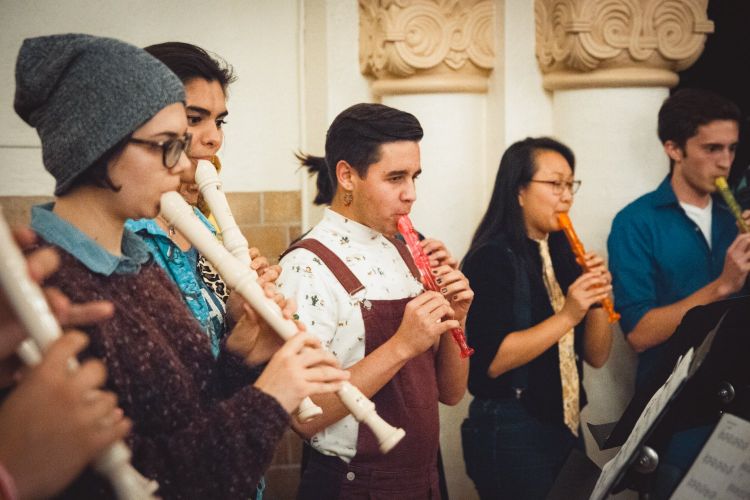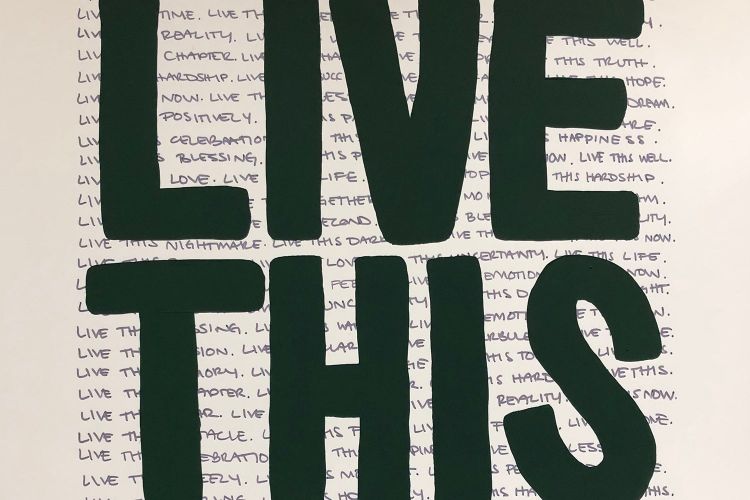Projects ranging from musical ensembles and painting classes to podcasts and videogames are among the first recipients of grants designed to cultivate artistic engagement during the COVID‑19 pandemic.
The COVID-19 Creative Community Response Grant, created by the Office of the Vice President for the Arts (VPA), is intended to foster creative expression that can connect people at a time when the campus community is geographically dispersed. The program has been spearheaded by Anne Shulock, assistant vice president for the arts, and is still open to proposals.
The idea for the grant program came quickly after the university started restricting campus events in early March and then asked students to leave campus, all in an effort to help slow the spread of COVID‑19. VPA generally awards grants tied to on-campus activities and in-person arts experiences, but when the university became a virtual environment, it was clear that there needed to be a different approach to grantmaking.
“With the disruption and uncertainty of the COVID-19 pandemic, the Office of Vice President for the Arts wanted to support the many members of the Stanford community who are feeling the deeply human need to express themselves and connect with others by making and sharing art,” explains Shulock. “The works and experiences that emerge will show the beautiful, personal, experimental and unexpected ways that our community is finding solace and strength through collective creation.”
A central tenet of the grant is that the art created should be publicly accessible, which for the most part means the projects take place online and can be accessed by anyone with an internet connection.
The grants continue to be open to students, faculty and staff and will be awarded on a rolling deadline until May 10.
Below are four projects bringing the Stanford community a little closer even as people must remain far apart.

Podcasting from an empty campus
The Comeup Collective launched its first podcast on March 11, 2020. Its four members, Garry Archbold, Mamadou Diallo, Mekhi Jones and Sheck Mulbah, all seniors, wanted to create a platform for people of color to share their experiences at Stanford.
“First-generation and low-income individuals typically aren’t allowed to take on creative ventures like these because they must prioritize financial security. We are here to show folks that they can do both.”

Stanford, but in Minecraft
Michael Byun, Kyle Yu and Jainil Sutaria, all sophomores, have been recreating the Stanford campus as an online multiplayer game. Palm trees, the Main Quad, Green Library, they’re there, but all on a screen and built with the unmistakable block-like shapes of the Minecraft videogame.
“It provides a familiar feeling place for Stanford students to gather virtually, perhaps helping restore some sense of normalcy during the quarantine. It could also be used as a platform for events. Prospective students might visit the Stanford Minecraft world to get a sense of the campus.”

Stanford recorder choir welcomes all
In the face of the postponement of live music making, a group of students including Julie Fukunaga, ’20, Olivia Popp, ’21, Merlin MacGillivray, ’20, Michael Svolos, ’20, Kalea Woods, ’20, and Omar El-Sabrout, ’19, are organizing new virtual opportunities for musical collaboration with the Stanford Recorder Choir.
“Our emphasis is on inclusivity. We want people to have access to playing in a musical ensemble no matter their experience or inexperience with music. We think it is extremely important for everyone to have a creative outlet during this time, so everyone is welcome, especially those with no musical or other artistic background.”

Painting your mantra
Sonia Garcia, a master’s student in design impact and a Knight-Hennessy Scholar, began painting at home and posting photos of her work on social media. Now, she hosts painting workshops online in Spanish and English.
“This project is meant to remind people that we are all in this together. I want to help form a new community rooted in self-expression, authenticity and acceptance.”
Media Contacts
Robin Wander, University Communications: (415) 286-3689, robin.wander@stanford.edu





